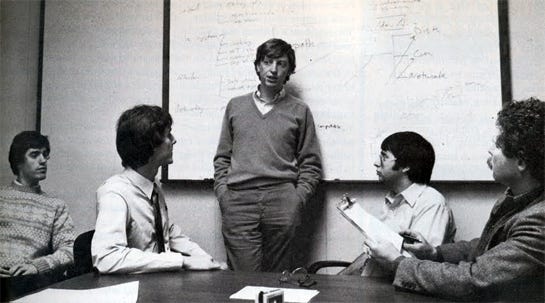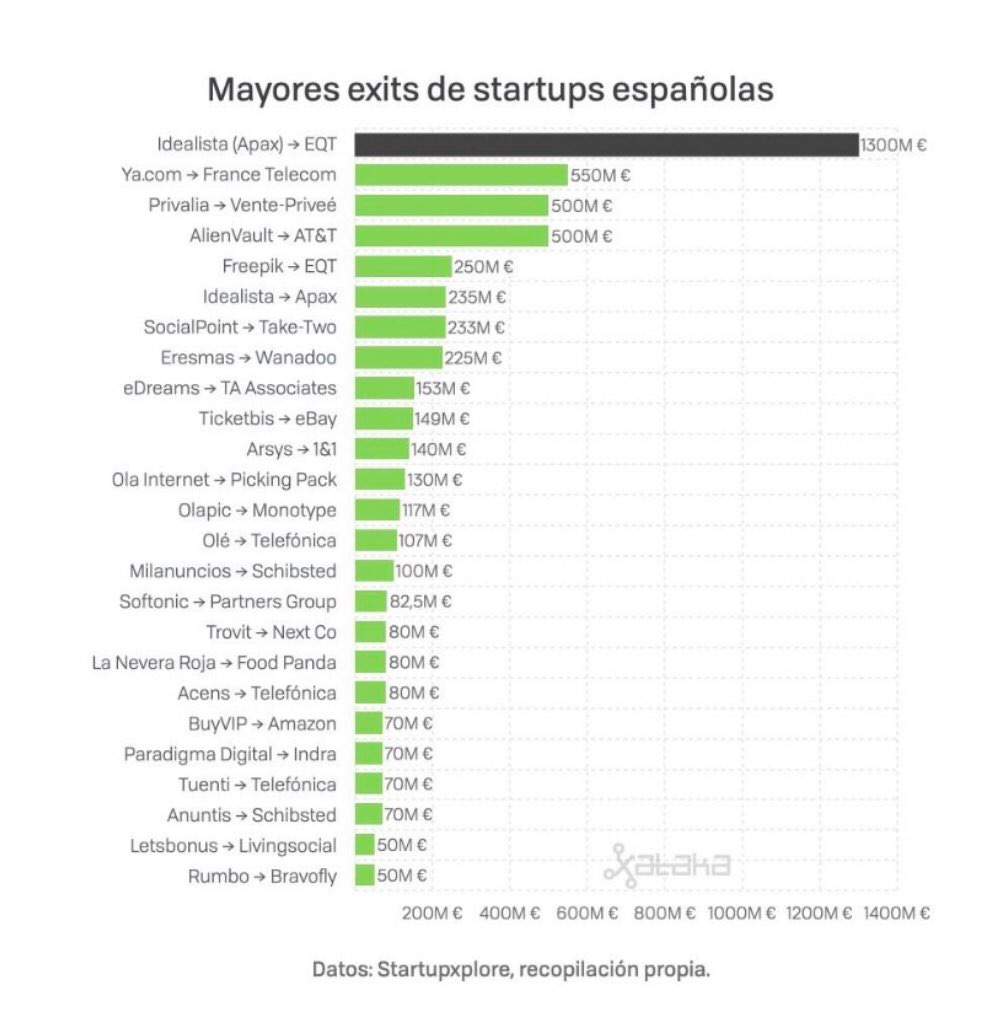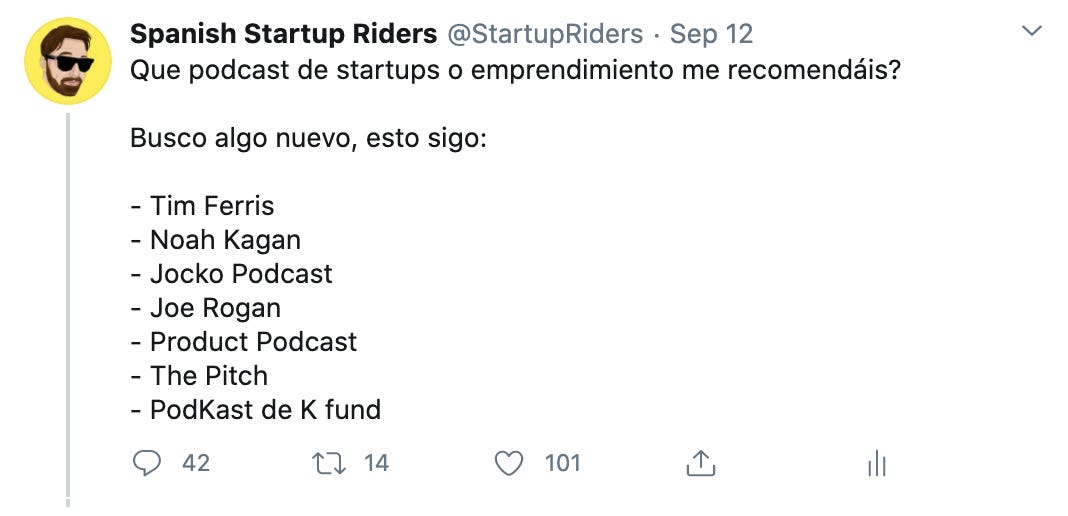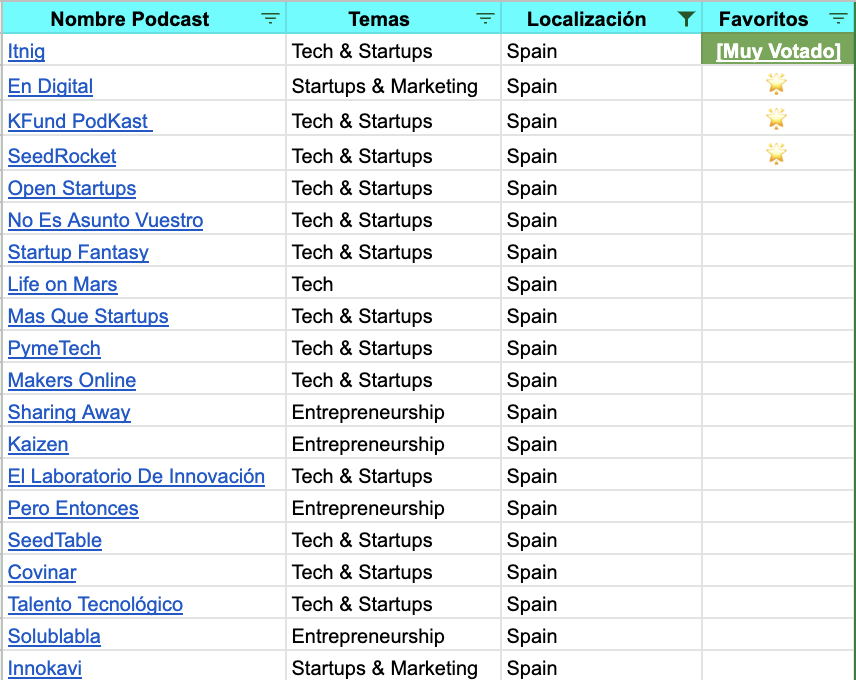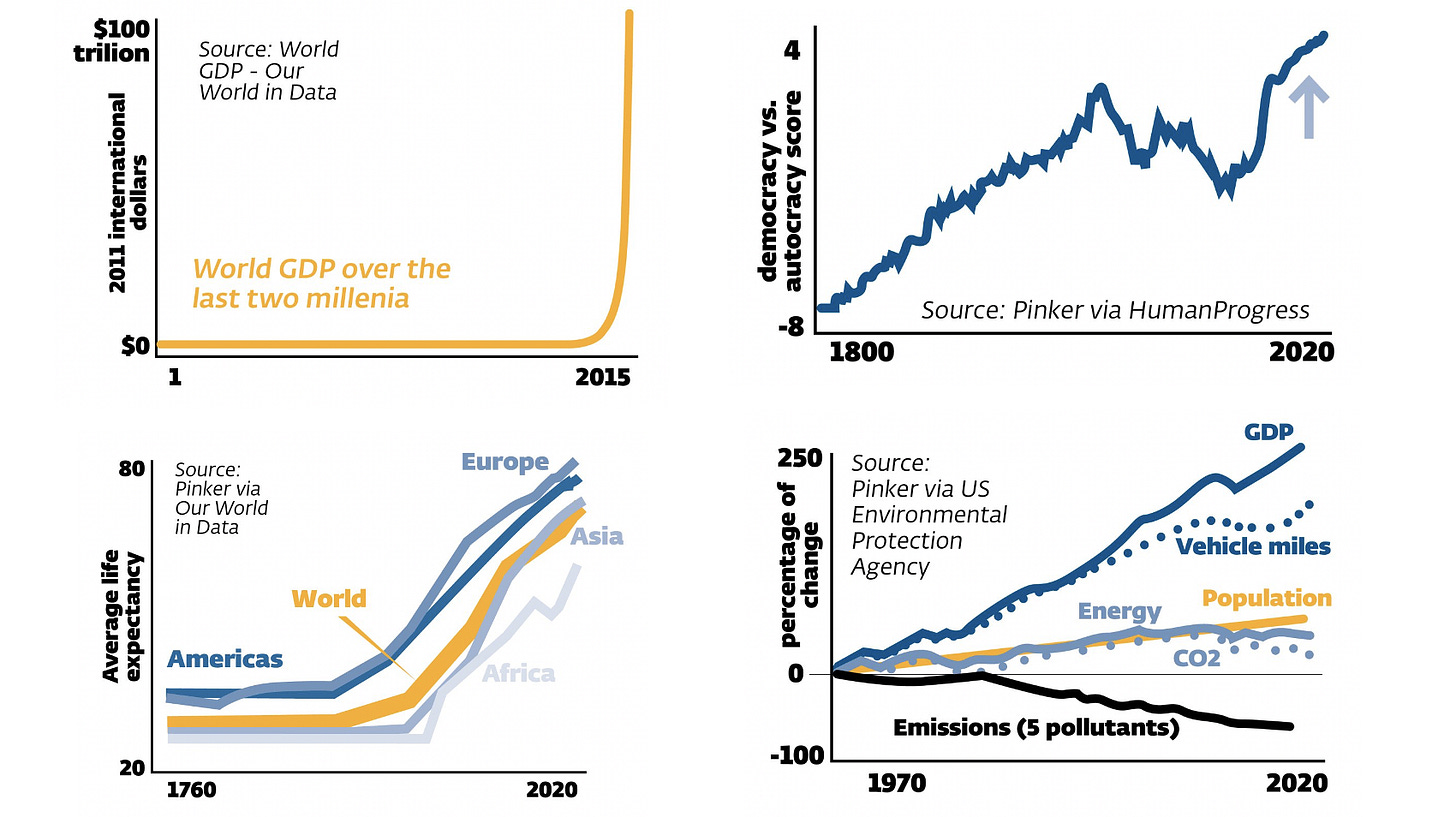🌊 What Early Apple Teaches Founders About Culture, Speed, and Thinking Big
Early Apple lessons, Idealista crushed it, splash some cash in France, the top entrepreneurship podcasts in Spain, a list of recently funded startup jobs and more!
I’m Ivan Landabaso, VC at JME.vc. I also love surfing and combat sports. Welcome to Startup Riders, your bi-weekly startup caffeine.
Summary | TL;DR
🎙️The Rise of Silicon Valley: Lessons from an early Apple veteran.
👏 Idealista Smashes It: An inflection point for Spain’s startup ecosystem?
🇫🇷 The French Splash Some Cash: A lifeline for startups during Covid.
🎧 Spanish Startup Podcasts: A database, based on your votes.
💵 Recent Deals: Capchase, Iomed, Adtuo, Algenex, Inbestme and more.
🦄 Startup Jobs: A list of startup jobs from recently funded Spanish companies.
💭Thinking or Reading: Bill Gates’ favorite book, deadlines not to miss & more.
Check out the Community Group to meet fellow riders and share your experience 🤙
🎙️ Lessons from an early Apple veteran - With Jeff Barco.
Introduction
I met Jeff on a beach in Santa Barbara, California. Extremely bright, humble and generous - him and his wife Cheri invited me to their home in Silicon Valley to kick-start my startup career (after talking for approximately 30 minutes). This kind of generosity, mentoring, social webs and startup culture is something I truly admire about our American friends in Silicon Valley.
Jeff’s trajectory is nothing short from epic - At 17, he started flying airplanes. His first job out of university was with a local technology distributor - Apple. He was the buyer. From 1980-2000, he worked at Apple-Silicon Graphics-WebTV-and Microsoft. Two decades of launching new products and building new revenue generating businesses - from ground zero including (amongst many others):
Apple Store (the first ever).
Apple Education.
Apple Digital Media.
Silicon Graphics.
WebTV Networks.
Microsoft Digital Television.
Jeff now runs the Genius Summit, working with technology innovators who seek support with product innovation and building sustainable businesses.
Interview
You’ve worked for both Steve Jobs and Bill Gates, what cultural traits would you export from their companies?
Steve and Bill shared something in common. They both represented the soul of the companies they founded and significantly influenced the culture. Both were college dropouts and self taught leaders. But beyond this, the two men were vastly different people and thus, the cultures different as well. I’ll frame for you each of the companies, what the environment was like and then, provide a sense of what I would export from each.
Recently Bill Gates said in an interview that he was jealous of Steve Jobs and that he was a genius. This is a good starting point to talk about Apple. In fact, having worked for both men, Bill is right. Steve was a genius and his genius permeated Apple’s culture and formed its DNA. Steve was exceptional in his ability to see things that others could not see, and articulate things in ways that others could not articulate. His brilliance was focused not just on designing and building great products, but understanding that it was the customer’s experience with the product that mattered the most. He was obsessed with products and so, anyone who touched any aspect of the product within Apple better be as obsessed as he was or more. The standards of excellence were insanely high. The work environment intense. Put on your helmet because you’re going in to battle. The company recruited an eclectic group of misfits that were highly intelligent, creative, and embraced the rebel spirit. There was no question that most of us couldn’t work at any other company because rules were designed to be broken. So this was the culture. Intense, passionate, confident, creative, explosive, chaotic and focused on designing product experiences that had the potential of changing the world. This is Apple’s DNA.
Alternatively, Microsoft under Bill Gates leadership, was a different kind of brilliant. Microsoft’s culture was far more pragmatic and mature. It was a pure engineering culture and very logical. Bill was Spock. And his followers largely mirrored Bill’s obsession with data and logic and order. The culture of Microsoft is analytical and strategic, with discipline, values of integrity and honesty, and accountability. It was akin to working for a large consulting company, such as McKinsey or Roland Berger. Product teams and product development were far more organized and systematic than Apple. Bill was a dictator and micromanaged everything and nothing was pushed forward without Bill’s direct involvement and approval. Because of Bill’s leadership style, there was less creative freedom and risk taking by internal teams because teams would “intuit” what Bill would want or think he would want and to avoid Bill’s wrath (which was intense) if you f—up. Bill was wicked smart, but not genius like Steve Jobs. He was thoughtful and calculated, and not comfortable with “gut calls” or emotionally charged decisions. Micorosoft’s culture was less chaotic and more disciplined. And, rather than product confidence, Microsoft’s confidence was derived from economic and marketplace success and monopolistic dominance. Inventing brilliant products was not #1. Market ownership was #1. This is Microsofts DNA.
So what are the cultural elements I would export? Logically, the culture should fit the kind of company you want to be within the industry and sub segment the company operates. If you want a radical change the world culture that fits your ambition (says Elon Musk), then match the culture with this ambition. For the most part, technology companies must have deeply rooted inventiveness and creativity as integral to their culture. Disruption comes giving your employees a safe environment to take risk. For my money, Apple’s culture of product innovation is much preferred for startups. But, Microsoft’s more systematic and logical “step by step” evolutionarily vs revolutionary culture has merit too. And finally, cultures MUST embrace a commitment to execution and implementation. If you can’t deliver your product or service, your venture is a non-starter. Period.
What belief, behavior, or habit have you learned in Silicon Valley that has most improved your life?
I tend to learn by doing. I also tend to overthink and over analyze. It is pretty clear this is a form of procrastination. And it's fear. But I am happiest and most productive when I am clear what I need to do and just start doing. You just can’t put off things that are fundamental or core to your achieving your goal. Jump in. Frame the opportunity simply. Be clear on goals. And how to measure progress. Then, lean forward and just execute.
Let me give you an example. Recently I heard a story about Elon Musk that describes the above. His team was meeting to discuss his Boring Company. It was early on and he ask his team lead when the project would start. The team lead said, he thought based on what they’ve analyzed, maybe 3-4 weeks. Elon listened and then said to this team, no—we’re going now. Like NOW! It is 1pm. The team jumps up and starts moving. By 5pm the SAME DAY, they have cleared the parking lot of cars, defined the hole location, brought in heavy equipment to dig the hole, and have started digging the hole for the entrance of the tunnel they would use for the prototype. Four hours. Message? Don’t delay. Start. Now.
What advice would you give your 20 year old self?
1) Know thyself. All of us have gifts. You have one or two things that you excel at and enjoy. Accentuate these things and apply these gifts to your initiative and to life. Abandoned the idea that you must be good at everything or a specific thing that you just hate doing. Life’s too short.
2) Find a mentor, advisor or a coach. You want someone who will be totally honest with you. Optimally, find someone who has deep experience in the areas you wish to learn. Don’t hesitate to ask someone you respect or admire for help or support. Trust me, people love to help.
3) Go bigger than you think. Be absolutely CLEAR what you want and resolve inner conflicts or ambiguity earlier vs later. Stretch yourself, invest in yourself and push yourself harder.
4). Be nice to yourself. Learn to love. Be the person others want to emulate.
How would you teach Spanish entrepreneurs to think bigger?
OK, some years ago I worked with a large group of entrepreneurs from Latin America. These were mostly very young entrepreneurs and my role was to evaluate their startup ideas and provide feedback. I can tell you that 95% of the ideas lacked ambition. They were very limited in scope and dimension, and frankly, didn’t merit a great deal of conversation. The ideas were just too small. I remember saying to these entrepreneurs, PEOPLE, come on — if you’re going to do something, anything, THINK BIG and ACT BIG because the amount of work required is about the same for a relatively small idea vs a BIG idea.
Look, I grew up in the middle of America and though both of my parents were professional people, I did not have any influence in my younger years that would have supported designing and building a business that was wildly ambitious. Certainly, not grand in scale. This influence came when I joined Apple.
Early on at Apple, because of our rapid growth, management would say to us, look don’t come to us with a product / business proposal that frames a business that is anything less than a billion in new revenue. A BILLION!!! These are 1980s dollars! So, in response, we had to shift our orientation and think harder and smarter about enabling technologies, products and applications of products that could driven billions in revenue. All that was really required was shifting our orientation. And, we got very good at doing it.
What is exportable about the Silicon Valley ecosystem, and what would you leverage in Spain to grow one?
Silicon Valley is one of the most extraordinary places on the planet when it comes to fertile land to grow great companies. Remember, before Silicon Valley existed, California was already a State in the Union that represented promise and opportunity. It had earned a reputation of where “all the crazies lived”, which of course, wasn’t true but what was true in the West coast is that it drew a certain type of person who wanted to operate out of the mainstream “thought”, and the freedom to think alternative realities. It is a MAKER culture but on the confidence to ask, what if?
California is the 5th largest economy in the world. It has 40m people, and a belief system and cultural orientation different than other parts of the U.S.
So, what’s exportable?
1. People. Actually, the type of people who are curious, willing to accept risks, think big, audacious, and ambitious. Diversity is good. Education good too (but remember, Steve and Bill were college dropouts). 2) Understanding and accepting risk is essential. This is largely cultural, but business leaders in Spain, who have taken risk and understand its value, can help educate a startup community 3) Capital is an essential component. 4) Support from the community, whether attorneys and accountants who will work pro bono or for percentage, is important component. Local government and universities play a huge role as well. What essential is that everyone is aligned, on the same page, and supportive of the startup community.
I have spent enough time in Spain to know that all the ingredients exist to build a favorable climate for entrepreneurs. 100%. The Spanish people are amazing. All that’s required is community members aligning themselves and joining forces, be supportive, promote each other, and celebrate accomplishments. It is entirely achievable.
What advice would you give entrepreneurs looking to raise money?
Be absolutely clear why you need the capital and where it will be applied. You must define “where is the pain” and have proof that demonstrates the value proposition. Be realistic but optimistic with projections. The Founder must show ability to be agile and to manage and drive teams. Show how you will measure progress. Show how you’ll be accountable. Build relationships and build TRUST.
I love startup businesses that solve REAL problems and have already demonstrated its ability to generate revenue, which translates, you have customers providing evidence that the value proposition works — and VC’s love this because it mitigates a bit of the risk. And, if the revenue is substantial enough, it helps tremendously in your ability to close a better deal with venture co’s. Keep as much equity as possible by showing proof you idea isn’t just an idea.
Finally, what are 1 to 3 books that have greatly influenced your life you'd recommend for entrepreneurs?
OK, this is somewhat challenging because I am a massive consumer of books. I have read literally hundreds of business books. But, Stephen Covey’s 7 Habits of Highly Effective People is one I still reference today and its was published many years ago. Jordan Peterson’s 12 Rules For Life, recommended by a Spanish friend, rates very high as well. And, Winning At New Products, by Robert Cooper — a book that I highlighted and dog eared a hundred times. And, a book that falls outside of business but is a story of life’s adventures, Undaunted Courage, by Stephen Ambrose, the story of Lewis and Clark.
👏 Idealista Smashes It
Now that we have some insights on how to invigorate our Spanish startup ecosystem - its time for a quick round of 👏 for our friends at Idealista.
And all of those that made this list of (relatively modest) Top Spanish Exits to date:
Source: StartupXplore
🇫🇷 The French Splash Some Cash
As part of the stimulus package to combat covid’s implications, Mr. Macron will spend $8.4 billion (€7 billion) on digital investments over the next 2 years.
They will be launching the 4th edition of the “Programme d’investissements d’avenir”, with €800 million exclusively dedicated to support French startups.
Moreover, as part of the same innovation program, France will spend €2.5 billion to invest in startup with Bpifrance acting as a traditional VC firm, and in VC funds directly (as LPs) - over the next 5 years.
The investment strategy seems 2-fold:
Seed & Series A: Maintaining investments.
Series A+: Fill the gap when it comes to late-stage funds.
Other interesting tactics emerging from the stimulus package:
€300 million on education for the tech sector.
€380 million for the digital transformation of small and medium companies.
€240 million for the digital transformation of car manufacturers and aviation.
€250 million on digital inclusion for elderly and simple administrative services.
$290 million in infrastructure for fiber network.
€1.7 billion to modernize public information systems.
Interesting to note that the French government sees this injection of capital as a way to safeguard Big Tech (including FANG) acquiring promising french tech startups - they believe this plan will help support other bigger French players in acquiring those emerging winners.
Net-net: they want to keep it in house.
IMO we could learn a lot from this plan in Spain - I particularly enjoy the transparency and favorable PR (vis-a-vis the rest of the world) that the program is bringing the French.
Food for thought: Why don’t we pick and chose the parts of this innovation plan that would work for our ecosystem (hypothesis)?
🎧 Spanish Startup Podcasts
We listened - here’s your database with the most upvoted podcasts in Spain (and some solid international ones) + snapshot below:
💵 Recent Deals
Capchase fintech startup raised $4.6 million.
IOMED health-tech startup raises €2 million from Adara Ventures.
Adtuo martech startup raises €187,000 through StartupXplore.
Algenex biotech startup raises €7.4 million led by Masterlux.
inbestMe robo-advisor raises €1 million from GVC Gaesco & Mutual Médica.
Humanox sport-tech (pretty-cool product) raises €1 million led by Univen.
Ikan Biotech raises €750,000 through Fellow Funders.
🦄 Startup Jobs
Here’s a quick list of recently funded startup jobs in Spain (this will grow soon):
Engineering General Application - Capchase - Madrid/Boston
Marketing General Application - Capchase - Madrid/Boston
General Application - Algenex - Madrid
Database Developer - Iomed - Barcelona
Frontend Developer - Iomed - Barcelona
Healthcare Data Engineer - Iomed - Barcelona
Senior Data Engineer - Iomed - Barcelona
NLP Data Science - Iomed - Barcelona
Senior NLP Data Science - Iomed - Barcelona
Data Engineer - Iomed - Barcelona
Phython Backend Dev - Adtuo - Madrid
Data Scientist - Adtuo - Madrid
Graphic Designer (intern) - Adtuo - Madrid
General Application - Inbestme - Barcelona
General Application - Ikan Biotech - Navarra
General Application - Humanox - Puerto De Santa María
Feel free to contact me with job listings.
💭Thinking or Reading
Be Positive - you’ve got good reasons to be.
If you’re feeling down - we also have a few reasons for that - I’d highly recommend you read “Enlightenment Now” by Steven pinker. The book shows just how short our collective economic memory is:
Deadlines Not To Miss
Spanish startup innovation awards 30K ➡️ bit.ly/2YWd3If
Accel Tips On Fundraising
If you find this interesting, please consider sharing with your friends. I’d also love to get your thoughts and feedback on Twitter. Until the next one! 😃


![The Macintosh 30th Anniversary Celebration Event [Liveblog] | Cult of Mac The Macintosh 30th Anniversary Celebration Event [Liveblog] | Cult of Mac](https://substackcdn.com/image/fetch/$s_!Pt3i!,w_1456,c_limit,f_auto,q_auto:good,fl_progressive:steep/https%3A%2F%2Fbucketeer-e05bbc84-baa3-437e-9518-adb32be77984.s3.amazonaws.com%2Fpublic%2Fimages%2F8cddcb91-09a9-4f63-a0db-592ce54d6b9d_640x230.jpeg)
